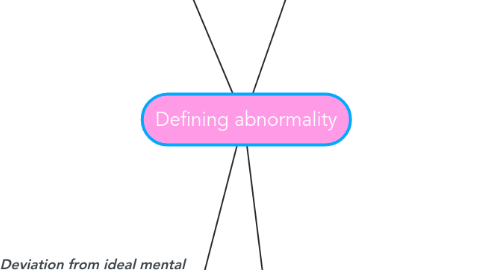
1. Deviation from social norms
1.1. This definition relates to behaviour that deviates from what is considered acceptable in a given culture (e.g. social norms governing dress for different ages and occasions).
1.1.1. There is no objective measurement as concepts of what is considered acceptable will vary from culture to culture.
1.1.2. Under this definition, abnormal behaviour could be considered to contribute to a disorder as a form of social control.
2. Deviation from ideal mental health
2.1. This definition proposes 6 criteria for mental health and presumes anyone who does not meet each of the criteria are vulnerable to issues with mental health.
2.1.1. It may not be easy for people to self-actualise.
2.1.2. It raises the question of to what extent is it beneficial to have a reduces resilience to stress?
2.1.3. Many 'normal' people would fail to fill each of the criteria.
2.2. 1. Positive view of self and awareness. 2. Potential for personal growth and self-actualisation. 3. Can adapt to changing circumstances (resilience). 4. Autonomy: can act independently. 5. Have an accurate perception of reality. 6. Can form positive relationships & environmental mastery (ability to love, work, have satisfactory relationships, etc.)
3. Statistical Infrequency
3.1. This definition relates to behaviour that is rare (e.g. hearing voices).
3.1.1. Some disorders (e.g. depression are statistically very frequent but are still classified as abnormal.
3.1.2. The cut off points are arbitrary (e.g. in the case of intelligence, an IQ of 70 is considered normal but an IQ of 69 is considered abnormal.
3.1.3. It ignores the desirability of the behaviour. A high intelligence is generally considered to be desirable as opposed to lower intelligence.
4. Failure to function adequately
4.1. This definition relates to an inability to cope with the demands of everyday life.
4.1.1. There is no objective criterion of measurement. It may depend on a family's ability to cope rather than the behaviour itself.
4.1.2. What is acceptable in one culture may not be acceptable in another.
4.1.3. However, it avoids biological or Psychological reductionism by recognising the interaction between social, cultural, and psychological factors.
